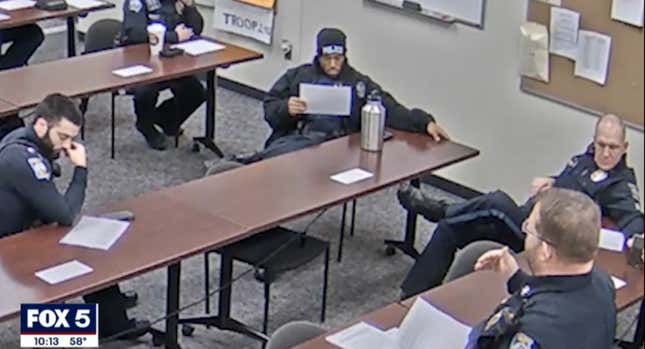
Despite laws prohibiting police departments from instituting traffic ticket quotas and despite police officials denying that their departments participate in the practice, stories keep popping up involving departments violating the rules or, at the very least, finding loopholes and incentivizing officers to write more tickets.
According to Fox5 Atlanta, in Douglassville, Ga., cops wrote 4,000 fewer tickets this past year than the year before and, instead of thinking, “Awesome! Maybe this means people are driving safer this year,” some in the Douglassville Police Department wondered why this was and decided to offer officers reasons to up the ante (so to speak).
“The numbers came out for traffic stops last year dropped from 14,000 to 10,000,” Lt. Brandon Nutter said in a Jan. 23 roll call meeting with 10 night shift officers, according to Fox5. “We’re shooting for six. That’s kind of a goal. One thing we thought about is if we average over five a shift ... one month ... quarter, we can go out and buy some steaks, pull the grill out, and do like a steak dinner for the shift.”
But what Nutter calls a “goal” looked more like a quota once he suggested an award for the “top performer.”
“I think if everyone’s hitting that benchmark of five or six ... they should get a certificate for that,” he told the officers.
A few days later, Nutter emailed officers promising more than just a certificate.
“Captain Weaver said if we write 75 tickets this rotation he will do something for the shift. He may come up and grill out for us or something. Just a challenge for us.”
Police Chief Gary Sparks sat down with Fox5 I-Team to assure the public that Douglasville does “not have a quota system.”
“I know that looks wrong,” said Sparks, who has been in law enforcement for 36 years. “We don’t condone that.”
When asked whether or not the captain had actually offered a cookout to shift officers for writing a certain number of tickets (or what honest people would call a quota), Sparks claimed, “He said he didn’t. It’s a misunderstanding as far as I know.”
From Fox5:
Like other cities, Douglasville budgets how much it expects to collect in fines and forfeitures each year. This year it’s $1.8 million. It sounds like a lot, but that’s only around 7 percent of all the revenue collected by the city.
Is that really enough to pressure police to write more tickets?
In a series of January emails obtained by the FOX 5 I-Team, police command staff tried to understand why the numbers had suddenly dropped. One analysis showed officers writing fewer tickets but more warnings, fewer tickets likely because they were busy responding to a jump in emergency calls for service last year.
Co-director of the Fines and Fees Justice Center Joanna Weiss believes, as any reasonable citizen would, that cops answering emergency calls instead of revenue hunting by issuing minor traffic tickets is a positive thing.
“Just to say you have to write a certain number of tickets, there’s no connection with what the public safety issues are,” she explained. “The truth is, if officers are responding to more calls for service, they’re being more responsive to the community. So that to me is a very good reason for ticket writing to go down.”
Fines and Fees Justice Center is a nonprofit group that advocates for cities to rely less on police revenue to balance their budgets so that the burden for balancing said budget isn’t passed on to citizens who have committed petty traffic infractions. Weiss also expressed concern over another document obtained by Fox 5 saying that it “raises very serious alarms.”
In January, the court clerk’s office compiled a six-month report showing how many tickets each officer wrote and how much money those tickets could be worth to the city in judgments. Each officer in the city had a dollar figure connected to their name.
When asked about the document, Sparks said he didn’t have any answers as to what those figures were, but said those numbers never put any officer’s job in jeopardy.
“Nobody lost their job (based on those numbers)” he explained. “And nobody’s going to lose their job in this!”
Then when asked why that info is included in the report, he said, “Because that’s my job to know as the chief. But we didn’t go to any of them officers and tell them you haven’t written these tickets.”
Guess we’ll just be taking his word for that.



